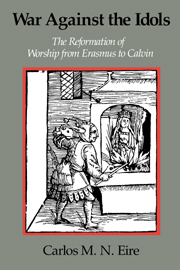Book contents
- Frontmatter
- Contents
- Acknowledgments
- Abbreviations
- INTRODUCTION
- 1 THE STATE OF LAY DEVOTION IN THE LATE MIDDLE AGES
- 2 ERASMUS AS CRITIC OF LATE MEDIEVAL PIETY
- 3 EARLY REFORMERS AND THE QUESTION OF IDOLATRY
- 4 ICONOCLASM, REVOLUTION, AND THE REFORMATION IN SWITZERLAND AND GENEVA, 1527–1536
- 5 HUMANISM AND REFORM IN FRANCE: THE SEEDS OF CALVINISM
- 6 JOHN CALVIN'S ATTACK ON IDOLATRY
- 7 CALVIN AGAINST THE NICODEMITES
- 8 FROM ICONOCLASM TO REVOLUTION: THE POLITICAL DIMENSIONS OF THE WAR AGAINST IDOLATRY
- CONCLUSION
- Index
6 - JOHN CALVIN'S ATTACK ON IDOLATRY
Published online by Cambridge University Press: 02 October 2009
- Frontmatter
- Contents
- Acknowledgments
- Abbreviations
- INTRODUCTION
- 1 THE STATE OF LAY DEVOTION IN THE LATE MIDDLE AGES
- 2 ERASMUS AS CRITIC OF LATE MEDIEVAL PIETY
- 3 EARLY REFORMERS AND THE QUESTION OF IDOLATRY
- 4 ICONOCLASM, REVOLUTION, AND THE REFORMATION IN SWITZERLAND AND GENEVA, 1527–1536
- 5 HUMANISM AND REFORM IN FRANCE: THE SEEDS OF CALVINISM
- 6 JOHN CALVIN'S ATTACK ON IDOLATRY
- 7 CALVIN AGAINST THE NICODEMITES
- 8 FROM ICONOCLASM TO REVOLUTION: THE POLITICAL DIMENSIONS OF THE WAR AGAINST IDOLATRY
- CONCLUSION
- Index
Summary
The streams of influence which we have been tracing between the humanist critique of medieval piety and the Reformed attack on Catholic worship come together once again in April 1534, when the young John Calvin paid a visit to the aged Lefèvre at Princess Marguerite's court in Nerac – perhaps as a way of paying homage to the leader of the circle with which he had been associated. He had already become an admirer of Gerard Roussel, with whom he corresponded often. Whether Calvin had rejected Lefèvre's circle by this time is not clear, but there is little doubt that, within a year, Calvin had already adopted a position that was much less conciliatory than Lefèvre's or Roussel's. Nicholas du Chemin, Calvin's former roommate at Orleans and a fellow admirer of Roussel, received a letter from Calvin in 1535 asking him to abandon Roman Catholic worship. Gerard Roussel also received a similar letter. The young Calvin had apparently reached the conclusion earlier reached by Farel, and the focal point of this change of mind appears to have been the issue of worship.
Calvin does not reveal much about the people who influenced his conversion to Protestantism. He may have come in contact with what was then called “Lutheranism” through personal contacts and reading during his student years at Paris, Orléans, and Bourges. Theodore Beza reports that Calvin was converted before 1526 by his cousin, Pierre Olivétan, but modern scholars doubt this story.
- Type
- Chapter
- Information
- War against the IdolsThe Reformation of Worship from Erasmus to Calvin, pp. 195 - 233Publisher: Cambridge University PressPrint publication year: 1986



